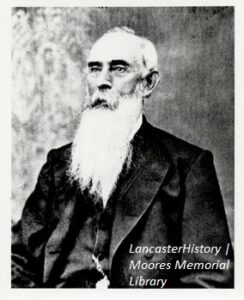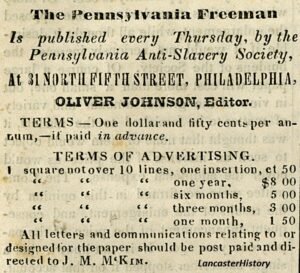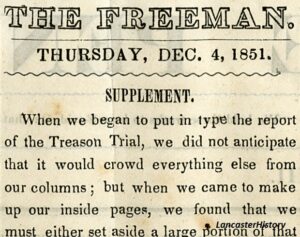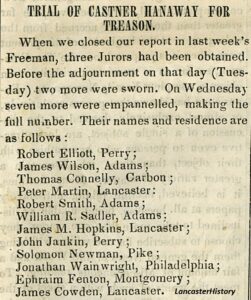Commemorating the Christiana Resistance
On September 11, 1851, a deputy U.S. marshal led a raid in Christiana, Lancaster County to recover four enslaved persons of Edward Gorsuch of Maryland in accordance with the Fugitive Slave Act of 1850. Free Blacks and freedom seekers in the surrounding area met this raid with a successful, but deadly, armed resistance.

The Fugitive Slave Act of 1850 allowed federal marshals to execute warrants for the arrest of freedom seekers based on an affidavit from a slaveholder; permitted commissioners to enlist the help of bystanders and organize posses; and denied Blacks who claimed they were free the right to testify on their own behalf. Anyone convicted of hiding or preventing the arrest of a freedom seeker faced a stiff fine and imprisonment.
The Gorsuch search party went to the house of William Parker, where an argument ensued and shots were fired. Dozens of members of the local Black community arrived to help Parker. Castner Hanway, a white neighbor who wanted to keep the peace, intervened in the search and asked Gorsuch and his party to leave. He asserted that his Black neighbors had a right to defend themselves and refused to aid the search party. The deputy U.S. marshal ordered a retreat, but Gorsuch stood his ground. An intense fight broke out; Gorsuch was killed and his son was injured.

The South wanted retribution. In this first test of the Fugitive Slave Act of 1850, the federal government was determined to enforce the law and charged everyone who opposed the raid with treason. Although many Blacks involved fled to safety in Canada, forty-one people, both Black and white, were indicted. Castner Hanway was the first to be tried. Thaddeus Stevens, Lancaster lawyer, politician, and abolitionist, served as one of the four defense attorneys. The trial began November 24 and the jury acquitted Hanway on December 11. The charges against the other defendants were later dropped.
|
|
The December 4, 1851 supplement of The Pennsylvania Freeman is a new addition to LancasterHistory’s collection. The newspaper reported on the Christiana Resistance and this issue covers the trial of Castner Hanway for his involvement in the incident with description and explanation of the proceedings. The testimonies from witnesses, members of the Gorsuch party, and residents of Christiana provide multiple perspectives on the Christiana Resistance.

The National Enquirer, an abolitionist newspaper, was founded in Philadelphia in 1836. It was renamed The Pennsylvania Freeman when John Greenleaf Whittier became editor in 1838 and was published by the Pennsylvania Anti-Slavery Society from 1838-1854. In addition to articles pertaining to the anti-slavery movement and abolitionist events in Philadelphia, New Jersey, and Delaware, the newspaper also printed marriage announcements, death notices, obituaries, and advertisements.
From Archives Blog

